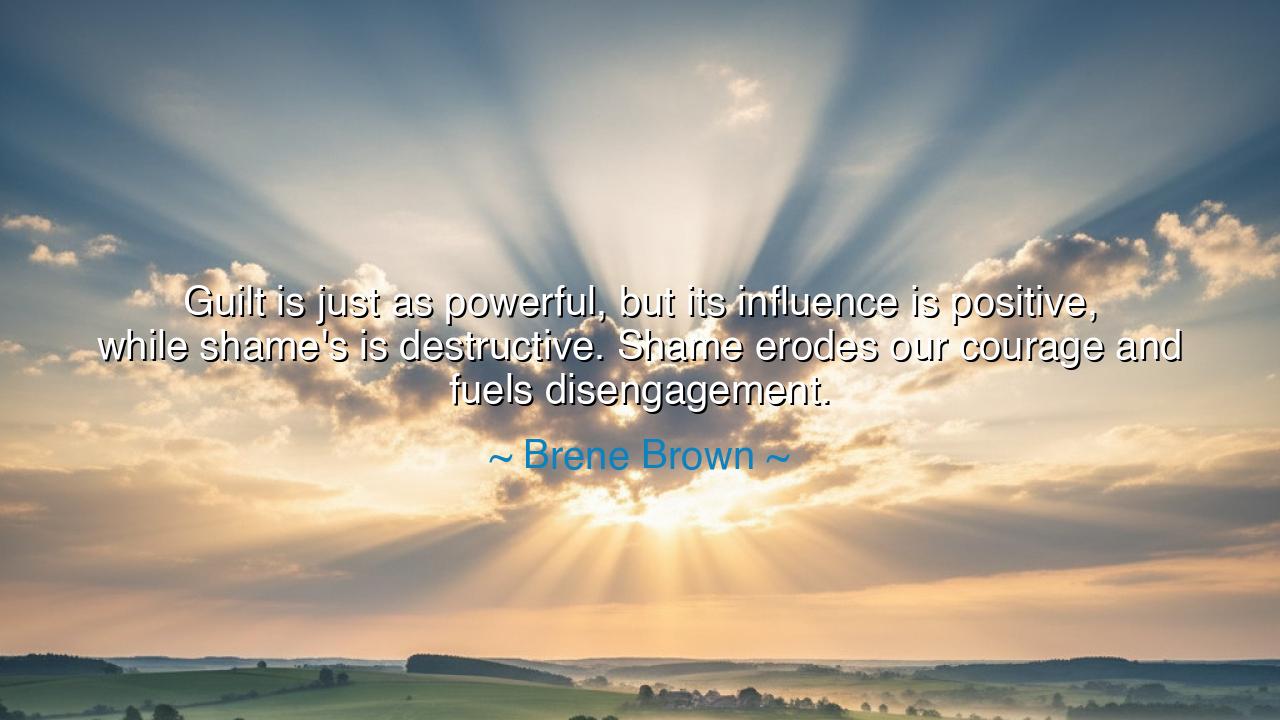
Guilt is just as powerful, but its influence is positive, while
Guilt is just as powerful, but its influence is positive, while shame's is destructive. Shame erodes our courage and fuels disengagement.






Brené Brown, the modern sage of vulnerability and courage, once spoke a truth that gleams like a mirror for the soul: “Guilt is just as powerful, but its influence is positive, while shame’s is destructive. Shame erodes our courage and fuels disengagement.” These words are not born of mere intellect, but of deep observation of the human heart. In them, Brown reveals a distinction as old as conscience itself — the difference between guilt, which awakens us to change, and shame, which imprisons us in despair. One calls us to redemption; the other chains us to self-condemnation.
In the wisdom of the ancients, emotions were seen not as masters, but as messengers. Guilt, in its truest form, is the whisper of the moral spirit — a call to realign with what is good and true. It says, “You have strayed; return.” But shame, darker and more insidious, does not call us to change; it tells us that change is impossible. Guilt speaks to the act; shame speaks to the self. Guilt says, “You have done wrong.” Shame says, “You are wrong.” Thus, where guilt births humility, shame breeds self-hatred. One is a doorway to healing; the other a wall of despair.
In the lives of great souls, we see this battle between guilt and shame. Consider Peter, the disciple of Christ. When he denied his Master three times, guilt pierced him like a sword. He wept bitterly, but his sorrow led him to repentance — to courage renewed, to love that would later carry him to martyrdom. Yet compare him to Judas, who also betrayed, but was consumed not by guilt, but by shame. He could not believe in forgiveness; he could not face redemption. And so, where Peter rose, Judas fell. Thus, the same fire that purifies the gold destroys the straw — guilt transforms the brave heart, while shame devours the fearful one.
Brené Brown speaks from the same eternal understanding: that shame erodes our courage. It tells us we are unworthy of connection, unfit for love, unredeemable in our flaws. It isolates the soul, drawing it away from others and from itself. Shame is the great silencer — it convinces the wounded spirit to hide, to disengage, to stop trying. In this sense, shame is the enemy not only of joy, but of growth. The one who listens to shame becomes a ghost in his own life, afraid to show his face to the world.
But guilt, when held in the light of compassion, is a teacher. It humbles, yet it also empowers. It says, “You can do better, because you are better.” It does not exile us from love, but reminds us of our longing to return to it. To feel guilt is to still possess the strength to care, to choose rightly, to seek reconciliation. It calls us not to self-destruction, but to courage — the courage to admit wrong, to make amends, to rise again. True guilt, born of conscience, is the seed of transformation; false shame, born of fear, is the rot that kills it.
Even in the old stories of heroes, this truth appears again and again. When King David fell into sin, his heart was heavy with guilt, but he did not allow shame to silence him. He cried out in psalm and prayer, “Create in me a clean heart, O God, and renew a right spirit within me.” His guilt became a bridge to grace, not a pit of despair. From his repentance flowed songs that still comfort the broken-hearted today. Such is the power of guilt rightly held — it restores courage where shame would have crushed it.
So, my child of the living spirit, learn to discern between these twin powers. When you have done wrong, do not sink into the poison of shame, for it will whisper that you are unworthy of redemption. Instead, let guilt guide you gently back to integrity. Reflect, make amends, seek forgiveness — and then, release it. Remember always that guilt invites healing, while shame denies it. To overcome shame, speak truth, connect with others, and stand in your own imperfection with grace. For the wise do not run from guilt — they use it as a lantern, lighting their way toward wholeness. And in that light, they find what shame could never give: the courage to love themselves again.






AAdministratorAdministrator
Welcome, honored guests. Please leave a comment, we will respond soon